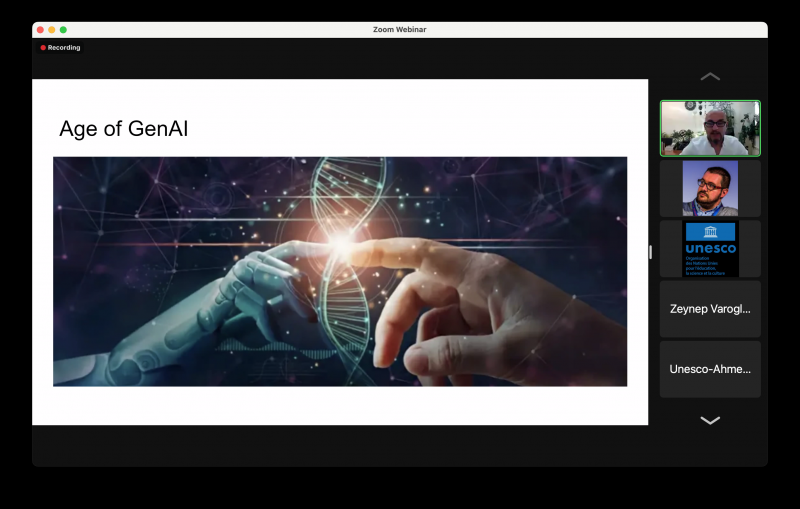Curriculum Vitae
Prof. Enrico Motta is Professor in Knowledge Technologies and Former Director (2000 -2007) of the Knowledge Media Institute (KMi) at The Open University in UK. He is also a Professor II at the Department of Information Science and Media Studies of the University of Bergen in Norway.
He has a Laurea (Master-level degree) in Computer Science from the University of Pisa in Italy and a PhD in Artificial Intelligence from The Open University.
Prof Motta is the Head of the Intelligent Systems and Data Science research group in KMi. His work spans a variety of aspects to do with large-scale data integration and modelling, semantic and language technologies, intelligent systems and robotics, and human-computer interaction. In particular much of his current work focuses on developing innovative approaches that integrate state of the art machine learning techniques with semantic and language technologies, to develop new solutions which support users i) in exploring and making sense of large-scale data and ii) in complex decision-making scenarios, involving humans and/or robots.
In March 2019, Prof Motta took up a Professor II position at the University of Bergen, to contribute to the development of the MediaFutures Centre and pursue a novel research line on the application of AI technologies to Computational Journalism and Media Analytics.
Prof. Motta has authored over 370 refereed publications; his h-index is 69, a figure that positions him among the top computer scientists in both UK (https://www.guide2research.com/scientists/UK) and Italy (https://tinyurl.com/3huxs4xw), in terms of this measure of academic impact. Together with Tom Heath he won the Semantic Web Challenge at the 2007 International Semantic Web Conference and, in collaboration with members of his research group, he won the best paper award at the 2008 and 2009 Asian Semantic Web Conferences. He also won several academic and business awards in the context of the MK:Smart project, a flagship UK smart city initiative, of which he was the Director.
Prof. Motta has supervised 23 PhD students to completion and examined 24. He has chaired the top international conference in his area of research, the International Semantic Web Conference, and given keynotes at over 50 international conferences in various research areas including Semantic Web, Knowledge Engineering, Smart Cities, Data Science, Intelligent User Interfaces, and Human Computer Interaction. He has been Visiting Professor at several research institutions, including the Universidad Politécnica de Madrid, University of Granada, University of Bari, the Italian National Research Council, University of Paris 13, and the University of Bergen.
Prof. Motta has acted as advisor on strategic research programmes to several national and international organizations in a variety of countries, including UK, US, The Netherlands, Austria, Finland, and Estonia. He has also given invited talks to dozens of non-academic organizations, including Springer Nature, Elsevier, Microsoft (Seattle), Siemens, TechMahindra, Huawei, ARM, Lockheed Martin, Oracle, Honda, Samsung, EPSRC, Telefonica, HSBC, Nokia, Hewlett-Packard, Tate Modern, NESTA, BBC, The Home Office, BankInter, Wind, TrueKnowledge, as well as several universities in Europe, Asia and North America.
He was Editor in Chief of the International Journal of Human Computer Studies from 2004 to 2018, one of the top two international journals in HCI according to Google Scholar and Microsoft Academic Search. In 2003 he founded the ground-breaking European Summer School on Ontological Engineering and the Semantic Web (SSSW), which provided the main international postgraduate forum for learning about semantic technologies until its final edition in 2016. The innovative pedagogic model pioneered in the SSSW series of summer schools has since been adopted by several other similar initiatives.
Over the years, Prof. Motta has led KMi's contribution to numerous high-profile projects, receiving about £12.6M in external funding from a variety of institutional funding bodies and commercial organizations.
In particular, as already mentioned, Prof Motta was the Director of the flagship £17.2M HEFCE-funded MK:Smart initiative, which was completed in June 2017. The award-winning MK:Smart project is an example of a 'smart city' project, one which has developed intelligent systems and analytics infrastructures to foster sustainable urban growth in Milton Keynes. Central to the project is the MK Data Hub, a computational infrastructure that supports the acquisition and management of vast amounts of data relevant to city systems from a variety of sources. Taking advantage of the sophisticated data management capability provided by the MK Data Hub, MK:Smart has realised innovative actions in transport, energy and water management, as well as ambitious business and community engagement activities, and educational ones.
Building on MK:Smart, Prof Motta is currently collaborating with MK Council and other partners in the MK Innovation Cluster to develop new solutions tackling urban challenges and sustainability issues in Milton Keynes and the wider region. Within this context he i) was Director of the CityLabs project, which supported SME innovation in the SEMLEP region; ii) organized the First International "Robots in Smart Cities" Competition (the SciRoc Challenge), which was held in Milton Keynes in September 2019; and iii) is currently leading the OU contribution to the MK:5G initiative.
Prof Motta is also working on innovative solutions for scholarly analytics, which leverage novel techniques in large-scale data mining, semantic technologies and visual analytics to support users in understanding the dynamic of academic communities. This work has attracted extensive interest from both academia and the commercial sector, leading to funding from the top two international academic publishers, Elsevier and Springer Nature, as well as collaborations with a variety of universities, including Tokyo, Bonn, Oxford, Bergen, Pittsburgh, Udine, Amsterdam, Aquila, Ohio State, and Vienna. In particular, a strategic partnership with Springer Nature, which has funded this research since 2014, has resulted in the Smart Topic Miner (STM) application, a solution that is in routine use within Springer Nature. STM assists editors in classifying conference proceedings with respect to the research topics provided by CSO, the largest taxonomy of research areas in Computer Science that is currently available.
Finally, another key area of current research concerns the development of intelligent robots, able to integrate state of the art machine learning techniques with knowledge-based reasoning, to improve their visual intelligence and make sense of their environment. A current application context for this work concerns the use of cognitive robots for in-house healthcare assistance.



